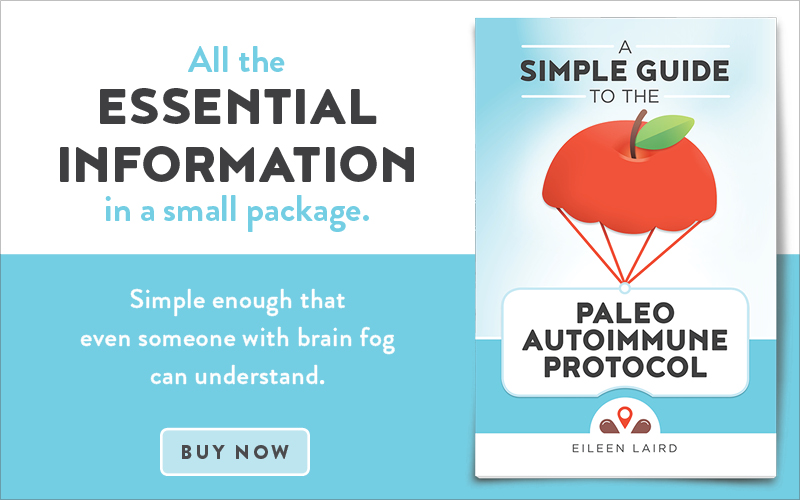“I didn’t want to upset my loved ones, but I couldn’t carry this alone.”
~ Julie Flygare
Gathering Your Tribe
Reversing autoimmune disease through diet and lifestyle is something no one can do for us. We’re the ones who decide the food we eat, what time we go to bed, how hard we push ourselves, whether we take time to de-stress. Yet, we don’t walk this world alone. We’re surrounded by friends, family and co-workers who are powerful influences on our lives. It’s a lot easier to stay on the healing path if we’re supported by those people, rather than thwarted by them. So, how do we get that support?
- Value Your Health Enough to Ask for What You Need: When it comes to reversing autoimmune disease, it’s time to put yourself first. This is an unnatural feeling for a lot of people. We’re used to taking care of others, often at the expense of ourselves. With autoimmune disease, our bodies are in crisis, and we need to do everything we can to heal ourselves. This is a time for self-love and self-advocacy, not self-sacrifice.
- Start With Your Home: If at all possible, have your household kitchen match your healing diet. Whether it’s a paleo or primal template, the autoimmune protocol, or a version of the Wahls Diet, remove the temptations by removing the foods you can’t eat. You may think this is unreasonable to ask of your family, but it’s not. Autoimmune disease has a powerful impact on the family, as well as the person who is sick. Your healing benefits everyone. Dr. Terry Wahls is currently doing clinical trials on the effectiveness of the Wahls Paleo Diet to reverse multiple sclerosis. The people who live in households that contain only Wahls-compliant foods, succeed at a much higher rate than those who don’t.
- Out of Sight Out of Mind: This doesn’t mean everyone in your family has to eat identically to you. Family members can eat as they wish outside of your presence; just ask that they avoid eating “forbidden” foods in front of you. Out of sight, out of mind, really does work. Simultaneously, your loved ones can enjoy the freedom of a wider diet without derailing yours.
- Eat Delicious Food: All you have to do is scroll through the AIP Recipe Collection on my website to see that the paleo template is anything but boring. It’s a natural human desire to want to enjoy our food, and just because we have autoimmune disease doesn’t mean we can’t. I eat amazing food every single day. Sometimes it’s a simple meal, sometimes it’s complex, and sometimes it’s a treat. I don’t let myself feel deprived. Also, the more delicious the paleo meals are that we serve our family, the less they’ll object to the change in menu.
- Healthy Compromises: While it’s preferable for your household to match your diet, I know that not everyone agrees to do this. So, how do you navigate sharing a kitchen safely? If your household won’t go 100% paleo, at the very least, ask for gluten-free, especially if you have celiac disease. The chance for gluten cross-contamination in a shared kitchen is extremely high, and that’s a risk you don’t want to take. After that, compartmentalize the kitchen. If most of your family is on-board and just one person isn’t, maybe they can keep their foods in a special cabinet in the kitchen, one you will simply avoid. If the reverse is true, then store your food on certain shelves in the fridge, freezer and cabinets, so you don’t have to reach past the takeout containers to get your ingredients for breakfast. Lastly, be honest about the foods that are most tempting to you, and ask that those be kept out of the house. For me, that would be pizza, not because it’s so delicious. In fact, I seem to remember it feeling like a bowling ball in my gut after eating it, and then I’d be hungry again an hour later. Even so, it has a strong scent that I find hard to resist, and it’s associated with a lifetime of memories. If someone walked into my house with pizza, I would have to leave, to keep myself from eating it. Figure out what those foods are for you, and ask that those be eaten outside of the house instead.
- Navigating Change with Friends: That’s your household, but what about your friends? These are the people you’ve likely socialized with over food, so a change in diet actually changes the nature of your friendship. You may not be comfortable eating in restaurants any more, and “happy hour” might be anything but happy if can no longer have the peanuts and beer. The first step is to have an honest conversation. Explain how your autoimmune disease makes you feel, and how this diet has the potential to make you feel infinitely better. If your friends love you, they’ll want you to heal. Tell them that their support means a lot. Try hard not to proselytize; often we’re a mirror to the people in our lives, whether we intend to be or not, and they think we’re judging their choices. Explain that this is about you, not them, and you aren’t going to try to change them. Lastly, come up with new ways to spend time together. Go for walks, meet for tea, go to a play, attend an art show, or invite them to your house for a meal, a movie, or a game of cards. There are lots of ways to spend time with those we love, and not be surrounded by foods we can’t eat.
- Let Your Healing Speak for You: If people aren’t supportive in the beginning, they often become supportive when they see the improvement in your health. Let’s face it, people are skeptical at first of this whole paleo idea. While it’s logical that diet and lifestyle have a huge impact on our health, that’s not what the TV commercials are selling, and culturally it’s not how we were raised. When I told my mother my plans to reverse rheumatoid arthritis with diet, she actually laughed out loud. She thought I was crazy. But when she saw that it worked, she became 100% supportive. Now, when I visit her, we cook AIP dinners for the whole family. The same thing can happen with your family and friends, so if your improvements aren’t visible, be sure to talk about them with the people in your life.
- Be Consistent: People will only take your diet as seriously as you do. If someone offers you an inflammatory food and says, “Here, have a bite. A little bit won’t hurt you,” and you eat it, they are going to keep tempting you. Why? Because you’ve just shown by your actions that your diet is flexible. This is the hard part: walking the healing path when there are people in your life who aren’t yet 100% supportive. Gather all the self-discipline at your disposal to say no. If you can avoid these people, do, and spend time with those who are encouraging your choices instead.
- Making New Friends: If there’s no one in your life who is supportive, it’s essential that you find that support elsewhere. Thankfully, there is a global community at your fingertips. If you’re on Facebook, there are a number of paleo and AIP groups: Autoimmune Paleo Recipes, AIP Support, Wahls Protocol Group and The Paleo Approach Community. Join some and make some new friends. There are also local meetup groups as well. See if there’s one in your area.
- The Workplace: Bringing your own food for lunch takes care of your daily needs, but occasionally there are work dinners or meetings with extra challenges. For the dinners, see if you can help organize them, picking a restaurant or catering company you trust. If you’re going to be tempted by donuts at a meeting, keep some paleo-friendly snacks on hand just for you. Ideally, your work should be about your contributions rather than your diet. Still, people might have questions. Often, it’s easier to keep the answers general: “I’m on a prescribed diet for health reasons.” Only people truly interested will ask more questions, and it’s up to you how much you decide to share.
You May Also Be Interested In
A version of this post originally appeared in my column in Paleo Magazine.
Credit: image at top of page from Scott Maxwell.











How do I join groups ?
Hi Michaela. Most of the groups exist on Facebook. Just click the link for the group you want to join and you should see a Join button. For local groups they use the online group on Facebook to plan in-person events.
I’VE ween my husband support 4 months after the begining of my healing journey. Hé now has understood the benefits and respect my choices. In France this aip is complet l’y new and therefore harder to talk about without being considered like a wirdo ! Thanksfully I can read english and “met” you and my Facebook support group!
Florence, I’m glad your husband got on-board, even if there was a delay. I’m glad you found the Facebook support group, too!
Outstanding Post Eileen! This will be a powerful post to share with Health Coaching Clients!
Thanks, Emma!
Ugh, work is the *worst*….I think it deserves its own whole post! I’ve lost out on numerous opportunities, I believe including a promotion, because I can’t sit down and eat in a restaurant. I’ll happily go to the restaurant, and even bring my own chow if it seems appropriate, but I absolutely cannot eat off the menu. So people now exclude me from business meetings because my food situation makes THEM feel awkward and/or guilty (I’m actually totally cool with being around whatever–I’ve long ago gotten over wanting food that hurts me). I’ve even started to think of it as almost like an ADA issue–I can’t do something which is tangential to actual work performance, and people punish me for it. Boo, hiss!
Wow Scooter, that sounds incredibly frustrating! I recommend advocating to get yourself back into those meetings. I have a friend and fellow blogger (Emma from The Bacon Mum) who has business meetings in restaurants all the time and mitigates the awkward feelings very well. She talks about it a little on my Paleo Travel Podcast (in the business travel segment), but she’s also a health coach if you want to contact her for 1:1 advice on how to approach this in your own office.
Great idea, I’ll check it out! Yep, totally frustrating. I suppose it might be for the best–I’m not sure my health could handle my career being successful. 🙂 I also got a lot of disgusted comments from coworkers about the food I do eat–now I’ve stopped eating in public areas, because I’d just rather not hear about how people would “rather die” than eat like I do. Seriously, people, who says that?! I shrug and go on, most of the time, but once in a while I have a distinct urge to smack somebody. 🙂 Probably everybody who’s on the healing track has war stories like this–thanks for making us feel less alone!
I would eat with you AND share your food! They don’t know what they’re missing. Junk food is what seems disgusting to me now. Honestly, I think it’s their fear talking a lot of the time, but it does sound like a very unsupportive atmosphere. I’m sorry you have to deal with that, Scooter. I hope you have at least one friend who “gets you.”
I find that people associate dietary changes with a desire to lose weight, which implies that it’s a temporary choice that one has made. The concept of food as medicine is a harder “sell.” When you’re “just on a diet,” the worst that can happen is you gain a pound or so and get back on the wagon the next day. When you’re healing your body with food (which a foreign concept to many), the results of “cheating” can be devastating, as we all know. Unless someone personally witnesses the effect the food has on you (pain, fatigue, bloating, flares, etc.), they couldn’t possibly understand. I’ve kind of stopped trying to justify my diet to friends and family – it’s just too exhausting! And, ultimately, I have to take responsibility for my health & environment. I tell them, it’s not about the food, it’s about the fellowship (so they don’t feel uncomfortable with me not eating or bringing my own food). I hope that the previous writer (the 76 year-old woman with 4 auto-immune diseases) would consider re-joining her husband and friends in the dining room for the healing element that fellowship and community offer – she could just bring her own food 🙂 Thanks, as always Eileen, for this great outlet!
“It’s not about the food, it’s the fellowship.” I love that!
I’m 76 and now find myself with 4 auto-immune diseases! We live in a retirement residence and I had to give dip eating in the dining room even though they would mark my menu with which foods were GF, I still was reacting. So my dear hubbie goes by himself and I eat alone , but his support is making all the difference! I have a friend who doesn’t really understand my determination to let food be my medicine she cheers me on Cuz I’m a crazy old lady like her! Support makes the difference….thanks again Eileen for all your hard work for us.
Sunny, you are an inspiration! Thank you so much for sharing.
Your posts are always so informative, I just love your blog! For years I had such a hard time explaining my diet to friends since my condition is so private, many don’t even know I have an autoimmune disease! I’ve just recently started feeling more comfortable telling people now that I feel like I’m truly healing on AIP.
It’s been so long since I’ve had pizza, I don’t need to taste, the smell is enough to satisfy me! Isn’t that crazy?
I think that’s awesome!
“This is a time for self-love and self-advocacy, not self-sacrifice~” So true, so challenging & so powerful when we find the ways to really embody it. Thank you for another excellent post, Eileen!
You embody it so well, Petra.
Excellent excellent tips, Eileen. Thank you.
Choosing this path to healing has been nothing short of miraculous for me. It has had it’s costs, however. My husband chose the prefix “ex-” over accommodating the many changes to how we used to enjoy food and friends together. Sometimes self-advocacy comes with hard choices. But no one and no food experience is worth sacrificing my health.
I would add one thing to your list, something that would have made those first few months a whole lot easier: It’s okay to ask family to share their descriptions of sumptuous restaurant meals or trips to the donut shop for what used to be your favorite treat with OTHER people but NOT someone on AIP. Sometimes people just don’t realize how deflating that can be.
I’m so sorry your husband made that choice, Meghan, but I’m so impressed with how peacefully strong you are. Thanks for sharing.
Thanks, Eileen. I know all the changes in my life might have felt insurmountable had I not found support in my online community and those friends who were able to stick with me. Life’s about change, and I’m grateful for the opportunities to grow through the changes.